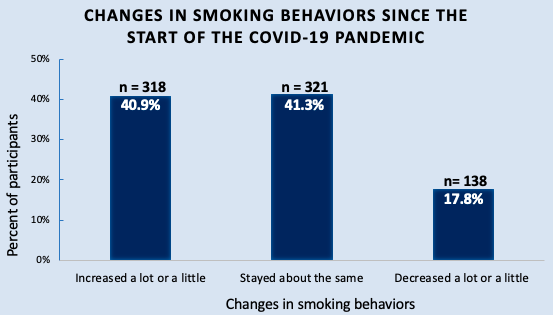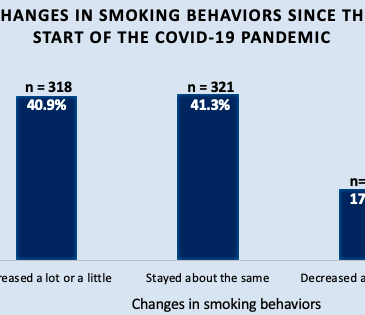Regular smokers are at a greater risk for a more serious COVID-19 infection. So, how has the pandemic impacted tobacco use? Are people increasing their smoking behaviors as a coping mechanism, or are they decreasing their smoking because they are worried about the severity of their potential COVID-19 infection? In this week’s ASHES, we review an article by Sarah Kowitt and colleagues that assessed what factors make cigar users more likely to have attempted to quit smoking, and have intentions to do so, due to COVID-19.
What was the research question?
How do cigar users in the United States perceive their risk of getting sick from COVID-19, and how has the pandemic impacted their smoking behaviors and their intentions to quit smoking?
What did the researchers do?
Kowitt and colleagues recruited a convenience sample of 777 participants online from April 23, 2020 to May 7, 2020 who were at least 18 years old, spoke English and had used traditional large cigars, little cigars or cigarillos in the past 30 days. Participants reported their demographics, their recent tobacco use, and several COVID-19-related measures (i.e., calling a quit line since COVID-19 started, perceived risk of complications due to COVID-19, perceived likelihood of COVID-19 infection,1 and frequency of social distancing efforts). Participants also reported on the following outcomes: 1) whether they had intentions to quit tobacco use within the next 6 months due to COVID-19, and 2) whether or not they made a quit attempt since COVID-19. The researchers tested bivariate associations between these variables and conducted a multivariate logistic regression analysis to assess which of the tobacco use and COVID-19 variables were associated with the quit attempts and/or intentions to quit.
What did they find?
Over three quarters of participants surveyed felt they, as tobacco users, were at risk of a more serious COVID-19 infection compared to non-smokers, and 71% of participants stated that they intended to quit smoking in the next six months due to COVID-19. However, approximately four in ten participants increased their smoking habits since the pandemic began, while a similar portion kept the same smoking habits and only a small portion decreased their smoking habits (see Figure). Those who reported greater social distancing efforts and those who believed they were at a higher risk for complications due to COVID-19 compared to non-smokers were more likely to report they intended to quit due to COVID-19. In addition, both increasing and decreasing tobacco use since the pandemic began and using smokeless tobacco (rather than cigarettes) in addition to cigars was associated with a quit attempt due to COVID-19.

Figure. Percent of participants reporting increasing, decreasing, or the same tobacco use use since COVID-19 started. Click image to enlarge.
Why do these findings matter?
Certain health conditions can put people at risk of having a more serious COVID-19 infection. Therefore, COVID-19 has instilled fear in some regular smokers that their habit suddenly now poses a more immediate risk to their health. This is an opportunity for healthcare providers to facilitate tobacco cessation by providing resources, such as tips to quit, ways to seek further support and health information about the process of quitting tobacco use. With increased support and information, patients will, hopefully, be more inclined to follow through with a quit attempt.
Every study has limitations. What are the limitations of this study?
Only cigar users completed this study, so the results may not be generalizable to all tobacco users. In addition, since this study only collected cross-sectional data very early on in the pandemic, the findings only provide one narrow view into the way tobacco habits have changed since COVID-19. Future research could look at tobacco use and the same COVID-19 variables in a longitudinal study to get a more accurate picture of how tobacco use has changed over the course of the pandemic. Finally, having called a quit line since COVID-19 (a predictor variable),could be considered a form of a quit attempt which was one of the outcome variables.
For more information:
SmokeFree offers tools and tips for quitting and maintaining abstinence from smoking tobacco. The Centers for Disease Control and Prevention also provides research and tips about cigarettes and how to quit. For more details about addiction, visit our Addiction Resources page.
— Alessandra Grossman
What do you think? Please use the comment link below to provide feedback on this article.
________________
[1] To assess COVID-19 risk perceptions, they adapted three questions from a previously validated scale to assess how likely participants thought it was that they would be infected by COVID-19 in the future.




